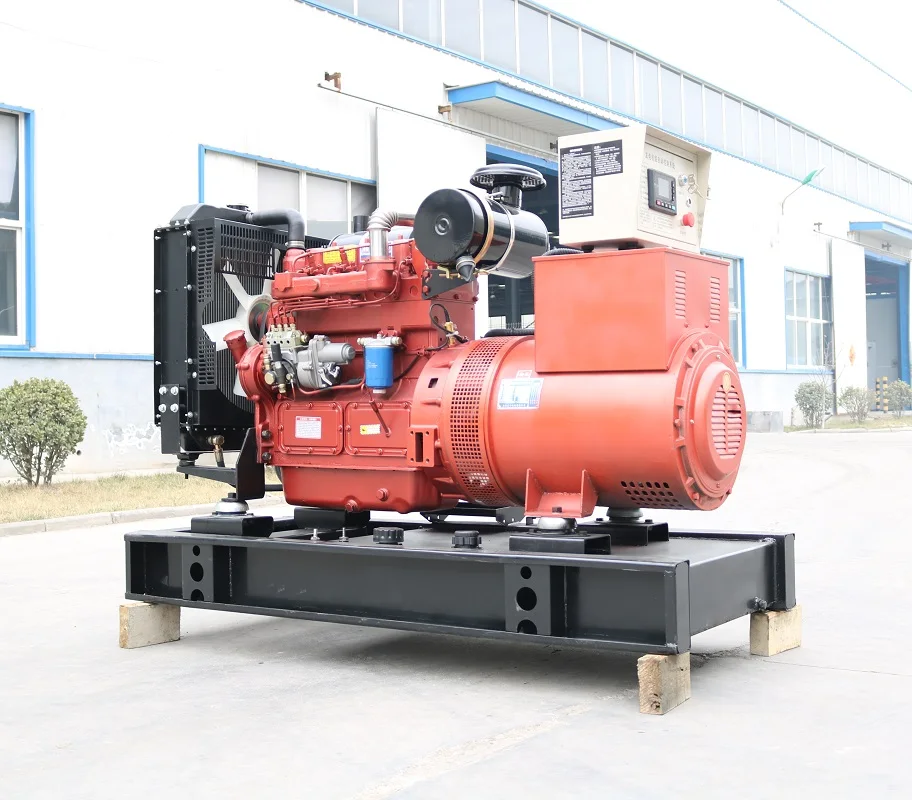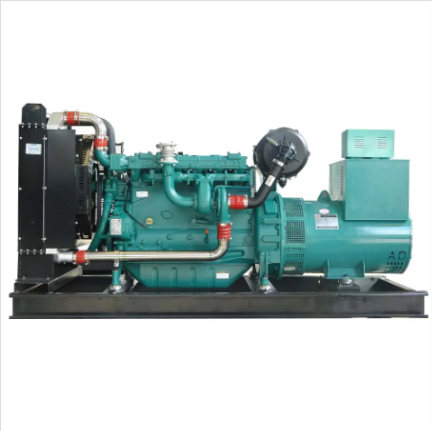Power outages can disrupt business operations, halt critical processes, and cost companies thousands of dollars in lost productivity. In industrial and commercial settings, reliable backup power is essential for maintaining operations, protecting equipment, and ensuring business continuity. A silent diesel generator offers the perfect solution for businesses requiring dependable power generation without the noise pollution associated with traditional generators. These advanced power systems combine the reliability and efficiency of diesel engines with sophisticated noise reduction technology to deliver uninterrupted power in noise-sensitive environments.

The evolution of generator technology has brought significant improvements in noise control, fuel efficiency, and environmental compliance. Modern silent diesel generators incorporate advanced acoustic enclosures, vibration isolation systems, and precision engineering to achieve noise levels as low as 58 decibels at seven meters distance. This makes them suitable for hospitals, schools, residential areas, and urban commercial facilities where noise restrictions are stringent. Understanding the key features, benefits, and selection criteria for these generators is crucial for making an informed purchasing decision that will serve your business needs for years to come.
Understanding Silent Diesel Generator Technology
Advanced Noise Reduction Features
Silent diesel generators employ multiple noise reduction technologies working in harmony to minimize sound output. The primary component is the acoustic enclosure, typically constructed from high-density materials with sound-absorbing properties. These enclosures are engineered with specific thickness and density requirements to effectively block and absorb engine noise while maintaining proper ventilation for cooling systems.
Vibration isolation systems play a crucial role in noise reduction by preventing engine vibrations from transmitting through the generator frame to the surrounding environment. Anti-vibration mounts, flexible connections, and specialized dampening materials work together to isolate mechanical vibrations that could amplify noise levels. The exhaust system also incorporates industrial-grade silencers with multiple chambers designed to reduce exhaust noise without compromising engine performance.
Engine Design and Performance Characteristics
The diesel engines used in silent generators are specifically designed for quiet operation while maintaining optimal performance characteristics. These engines typically feature precision-balanced components, enhanced combustion chamber designs, and advanced fuel injection systems that reduce mechanical noise and improve operational smoothness. The integration of electronic engine management systems allows for precise control over engine parameters, optimizing performance while minimizing noise generation.
Cooling systems in silent diesel generators are engineered for whisper-quiet operation using variable-speed fans and optimized airflow designs. The radiator and fan assemblies are carefully positioned within the acoustic enclosure to maximize cooling efficiency while maintaining noise reduction effectiveness. Advanced temperature monitoring systems ensure optimal engine operating conditions while preventing overheating in enclosed environments.
Key Benefits of Silent Operation
Compliance with Noise Regulations
Modern urban environments impose strict noise regulations that can significantly impact generator installation and operation. Silent diesel generators are engineered to meet or exceed local noise ordinances, making them compliant for use in residential areas, hospitals, schools, and other noise-sensitive locations. This compliance eliminates the risk of fines, legal issues, and operational restrictions that can arise from exceeding permitted noise levels.
The ability to operate within regulatory noise limits also expands installation options, allowing businesses to position backup power systems closer to their facilities without violating setback requirements. This flexibility can result in reduced installation costs, shorter electrical runs, and improved system efficiency. Additionally, compliance with noise regulations demonstrates corporate responsibility and helps maintain positive community relations.
Enhanced Operational Flexibility
The quiet operation of a silent diesel generator provides unprecedented operational flexibility for businesses operating in noise-sensitive environments. These generators can run continuously for extended periods without causing disruption to nearby activities, making them ideal for applications requiring long-duration backup power or continuous standby operation.
This operational flexibility extends to timing restrictions as well. Unlike conventional generators that may be subject to operational hour limitations due to noise concerns, silent generators can operate during nighttime hours, weekends, and in densely populated areas without creating disturbances. This capability is particularly valuable for critical facilities that require 24/7 power availability and cannot afford operational restrictions based on time or location.
Selection Criteria and Sizing Considerations
Power Output Requirements
Determining the appropriate power output for a silent diesel generator requires careful analysis of your facility's electrical load requirements. This assessment should include both essential loads that must be maintained during power outages and non-essential loads that can be temporarily disconnected to optimize generator sizing. Load analysis should consider peak demand, starting currents for motors and equipment, and any planned facility expansion that might increase power requirements.
Silent diesel generators are available in a wide range of power outputs, from compact units suitable for small commercial applications to large industrial units capable of powering entire facilities. The selection process should account for load growth projections, redundancy requirements, and operational efficiency considerations. Oversizing a generator can lead to poor fuel efficiency and increased maintenance requirements, while undersizing can result in inadequate power availability and potential equipment damage.
Environmental and Installation Factors
Environmental conditions at the installation site significantly impact generator selection and performance. Factors such as ambient temperature, altitude, humidity, and exposure to corrosive elements must be considered when specifying a silent diesel generator. High-altitude installations require derating calculations to account for reduced air density, while extreme temperature conditions may necessitate additional cooling or heating systems.
Installation space constraints also influence generator selection, particularly for silent units that require additional space for acoustic enclosures and ventilation systems. Proper clearances must be maintained for air intake and exhaust, maintenance access, and fuel supply connections. Site preparation requirements include foundation design, electrical connections, fuel system installation, and compliance with local building codes and safety regulations.
Maintenance and Operational Considerations
Preventive Maintenance Requirements
Silent diesel generators require comprehensive preventive maintenance programs to ensure reliable operation and longevity. The enclosed design of these units necessitates careful attention to ventilation and cooling system maintenance, including regular cleaning of air filters, inspection of cooling fins, and verification of proper airflow patterns. The acoustic enclosure materials and sealing systems require periodic inspection to maintain noise reduction effectiveness.
Engine maintenance for silent diesel generators follows established diesel engine service intervals but may require additional attention to components operating in enclosed environments. Oil change intervals, fuel system maintenance, and cooling system service must be performed according to manufacturer specifications to prevent premature wear and ensure optimal performance. Regular load bank testing is essential to verify generator capacity and identify potential issues before they affect critical operations.
Fuel System Management
Fuel system design and management are critical factors in silent diesel generator operation, particularly for units installed in enclosed spaces or areas with strict environmental regulations. Fuel storage systems must comply with environmental regulations regarding containment, spill prevention, and vapor control. Regular fuel quality testing and treatment are essential to prevent fuel degradation that can cause engine problems and reduced performance.
Advanced fuel management systems can monitor fuel levels, quality, and consumption patterns to optimize generator operation and maintenance scheduling. Automated fuel transfer systems and remote monitoring capabilities enable proactive fuel management and reduce the risk of fuel-related operational issues. Proper fuel system maintenance includes filter replacement, water removal, and biocide treatment to prevent microbial growth in stored fuel.
Cost Analysis and Return on Investment
Initial Investment Considerations
The initial cost of a silent diesel generator typically exceeds that of conventional open-frame units due to the additional engineering and materials required for noise reduction. However, this premium investment often provides significant returns through expanded installation options, regulatory compliance, and operational flexibility. The total cost analysis should include equipment purchase price, installation costs, site preparation requirements, and any necessary permits or approvals.
Financing options and tax incentives may be available for businesses investing in backup power systems, particularly those that improve facility resilience and business continuity. The ability to install silent generators in locations that would not accommodate conventional units can result in cost savings through reduced electrical runs, simplified installations, and elimination of remote installation requirements.
Long-term Operational Economics
The long-term economics of silent diesel generator ownership extend beyond fuel costs to include maintenance requirements, regulatory compliance, and operational availability. Silent generators often demonstrate superior fuel efficiency compared to older conventional units, resulting in lower operating costs during extended outages or continuous operation periods. The enclosed design can also provide protection from weather and environmental conditions that might accelerate wear in open-frame units.
Insurance considerations may also favor silent diesel generators, particularly for installations in noise-sensitive areas where conventional generators might be restricted or prohibited. The ability to maintain operations without noise-related disruptions can provide significant value through avoided downtime costs, maintained customer service levels, and protection of critical processes during power outages.
FAQ
What is the typical noise level of a silent diesel generator
Silent diesel generators typically operate at noise levels between 58-75 decibels measured at seven meters from the unit. The exact noise level depends on the generator size, enclosure design, and manufacturer specifications. Most quality silent generators achieve noise levels comparable to normal conversation or moderate traffic, making them suitable for installation in residential and commercial areas with strict noise ordinances.
How does the enclosed design affect maintenance access
Modern silent diesel generators are designed with maintenance accessibility in mind, featuring removable panels, hinged doors, and strategically positioned service points. While the enclosed design requires some additional steps for routine maintenance, manufacturers typically provide adequate access for oil changes, filter replacement, and routine inspections. Service intervals may be slightly extended compared to open units due to the protected environment, but proper maintenance procedures must be followed to ensure reliable operation.
Can silent diesel generators operate continuously for extended periods
Yes, most silent diesel generators are designed for continuous duty operation and can run 24/7 when properly maintained and sized for the application. The enclosed design actually provides protection from environmental factors that might limit continuous operation in open-frame units. However, continuous operation requires adherence to maintenance schedules, proper fuel management, and appropriate cooling system design to ensure long-term reliability.
What factors affect the cost difference between silent and conventional generators
The cost premium for silent diesel generators is primarily attributed to the acoustic enclosure, specialized noise reduction materials, enhanced cooling systems, and additional engineering required for quiet operation. Factors affecting the cost difference include generator size, noise reduction level achieved, enclosure materials and construction quality, and additional features such as remote monitoring or advanced control systems. While initial costs are higher, the expanded installation options and operational flexibility often justify the investment.

